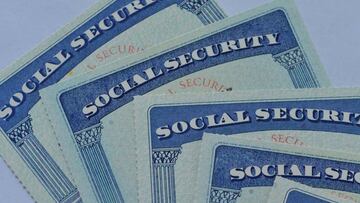Will Social Security beneficiaries get a fourth stimulus check?
The Senior Citizens League (TSCL) is calling on Congress to approve an additional round of direct payments for senior citizens to mitigate the effects of inflation.


The third round of stimulus checks saw more than 169 million payments sent out to eligible Americans, and some are pushing for a fourth as inflation continues to bite. The threat of the more contagious covid-19 variant, Omicron, has spooked the markets and created new wave of illness.
In early January the United States surpassed one million covid-19 cases in a single day for the first time, and then went on to beat that record in each of the three following days. With individuals forced to self-isolate after a positive test there is concern that millions could have their livelihood threatened.
The non-partisan advocacy group Senior Citizens League (TSCL) has called on Congress to send those receiving Social Security additional stimulus money. In a letter, TSCL Chairman Rick Delaney implored leaders in Congress to approve a one-off $1,400 Social Security stimulus payment for seniors.
Read more
- What is a lump sum Social Security payment?
- Cowboy’s round-up: Daily Dallas digest
- Social Security: what is the rule for people over 66 to take into account in 2022?
- Dog? Duck? Rabbit? The beach cliff that has tourists debating
- What is Russia’s ‘ghost ship’ tactic?
The Omicron crisis comes at the same time as high levels of inflation in the American economy have seen prices soar across the country. Those on a fixed income like Social Security are seeing rapid decreases in their purchasing power. The Bureau of Labor Statistics has reported that since October 2020, consumers are paying on average 6.2 percent more across the market. Prices for food are up 5.3 percent.
Social Security Administration announced a historic COLA increase
The campaign began before the announcement of the 5.9 percent COLA increase, but has continued after reports from thousands of seniors said they were experiencing extreme financial hardship as prices began to trend upward. Many have expressed a feeling of abandonment from the government telling TSCL “our government has forgotten about us.”
Researchers with the TSCL have found that costs for seniors have outpaced COLA increase. While over the last twenty-one years, “COLAs have raised Social Security benefits by 55 percent,” the costs for housing and healthcare increased 118 and 145 percent, respectively.
The stimulus law transformed the CTC into a near-universal child allowance with the 1st of 6 checks going out in July.
— Joseph Zeballos-Roig (@josephzeballos) January 14, 2022
It was meant to establish a new link between children and the government, like the type that exists between Social Security and seniors.https://t.co/kOf5J3x51d
Is a new stimulus check coming for Social Security beneficiaries?
On Friday 19 November, the House of Representatives passed the Build Back Better Act. While it does not include a stimulus check for those on Social Security it does include some benefits for seniors. These include the expansion of Medicare to include hearing services, and provisions that will grant the government power to negotiate a limited about of drug prices with pharmaceutical companies each year.
However, the bill could not be passed before Christmas after key moderate Democrat Sen. Joe Manchin announced that he would not support the Build Back Better bill.
The bill would have extended the Child Tax Credit, but had no provisions for another stimulus check. So far, leaders on Capitol Hill have been silent on their support or opposition to a targeted stimulus check for seniors.
Seniors feel the brunt of inflation pressures
Related stories
The Center on Medicare and Medicaid announced a 14.5 percent increase in the price of the Medicare Part B premium which is subtracted from a Social Security beneficiary’s check each month. From 2020 to 2021, the price only increased two percent, showing the impact that inflation is having on the healthcare market.
After the increase was announced, Mary Johnson, a Social Security and Medicare policy analyst urged leaders to take action and warned that “The Part B increase from $148.50 to $170.10 per month is the highest since 2016 and will consume the entire annual cost of living adjustment (COLA) of Social Security recipients with the very lowest benefits, of about $365 per month.”

